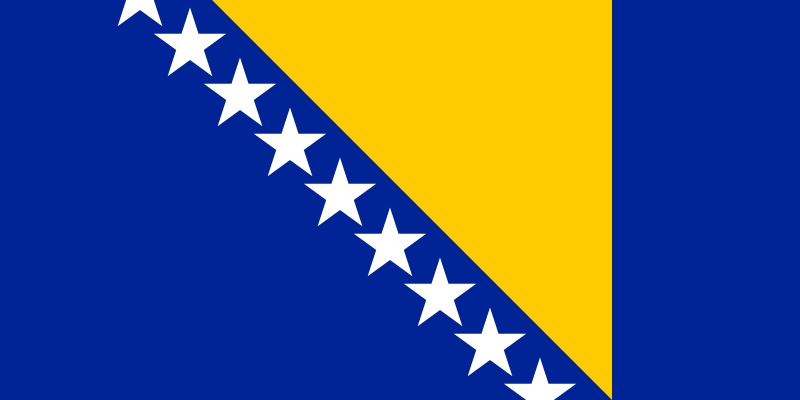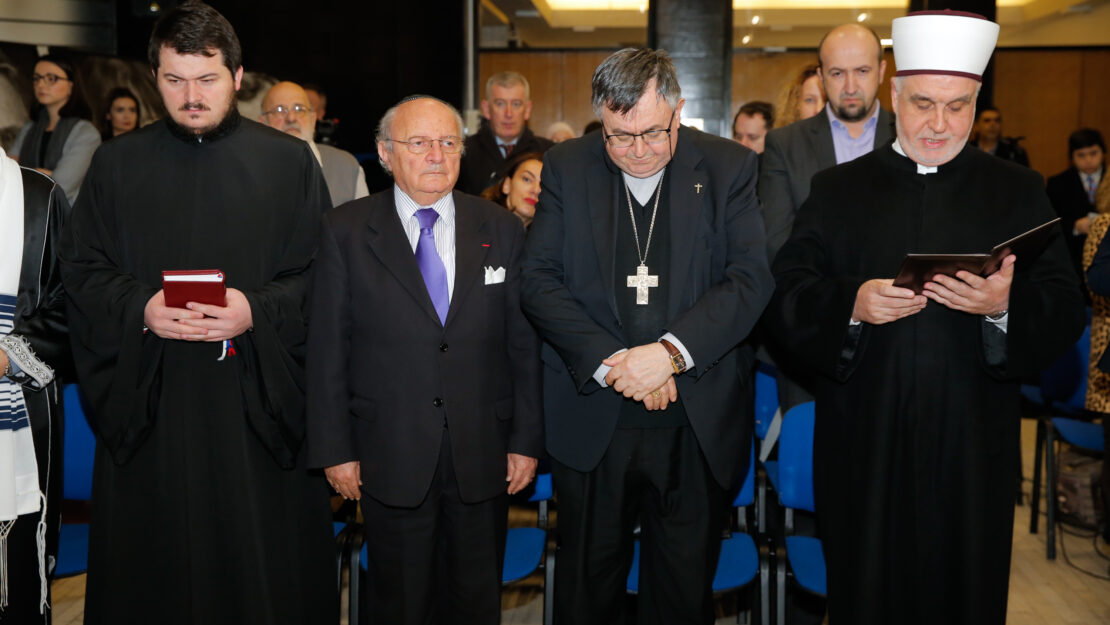

Bosnia and Herzegovina: Faith as a Fault Line (Historical)
Basic Facts:
The Bosnian War (1992-1995) was a catastrophic eruption of ethno-nationalist violence following the disintegration of the Socialist Federal Republic of Yugoslavia. Bosnia and Herzegovina’s declaration of independence in 1992, following referendums boycotted by most Bosnian Serbs, was met with a devastating military campaign by the Army of the Republika Srpska (VRS) and paramilitary groups, supported by Serbia’s Slobodan Milošević. The conflict, primarily between Bosniaks (Bosnian Muslims), Bosnian Serbs (Orthodox Christians), and Bosnian Croats (Catholic Christians), was characterized by a systematic campaign of ethnic cleansing, the siege of Sarajevo, the establishment of concentration camps, and the deliberate destruction of cultural and religious heritage. The genocide against Bosniak men and boys in Srebrenica in July 1995, perpetrated by the VRS under the command of Ratko Mladić, stands as the worst atrocity on European soil since World War II. The war was ultimately halted by NATO airstrikes and concluded with the Dayton Peace Agreement in November 1995, which created a complex, decentralized state structure divided into two entities: the Bosniak-Croat Federation and the Republika Srpska. While the violence was driven by secular nationalist agendas, religious identity served as the primary marker for differentiation and target selection, transforming churches and mosques into battlefields and symbols of ethnic presence.
Perspectives:
The Bosniak Narrative: For Bosniaks, the war was a fight for the very survival of their people and their multi-ethnic vision of Bosnia. Having lived for generations as a secular European people, they found their Muslim identity suddenly politicized and targeted for annihilation. Their struggle was framed as a defense against genocide and a fight to preserve a state where they could be equal citizens. The desecration and destruction of mosques and the killing of religious leaders were seen not just as acts of war but as a systematic attempt to erase their cultural and spiritual footprint from the land.
The Bosnian Serb Narrative: Guided by a potent mix of historical grievance and expansionist nationalism, many Bosnian Serbs, led by figures like Radovan Karadžić, feared becoming a minority in an independent Bosnian state. They invoked the memory of World War II atrocities committed by the Croatian Ustaše against Serbs to justify their preemptive campaign to secure territory and create an ethnically homogeneous Republika Srpska, ideally to be united with Serbia. Their actions were framed as a necessary defense of the Serbian nation and the Orthodox faith, protecting their people from a perceived historical cycle of victimization.
The Bosnian Croat Narrative: Initially allied with Bosniaks against the Serb forces, many Bosnian Croats’ ambitions shifted towards creating their own ethnically pure entity, Herzeg-Bosnia, with the goal of eventual unification with Croatia. Their narrative wavered between a partnership in a multi-ethnic Bosnia and a separatist agenda fueled by Zagreb’s influence, viewing both Serb domination and a Bosniak-majority state as threats to their own national and Catholic identity.
Philosophical Approach:
Central Question: When religious identity is weaponized for political and ethnic violence, can it ever be reclaimed for its original spiritual purpose, or is it permanently corrupted? The Bosnian War presents a stark case study in the instrumentalization of faith, forcing an examination of the relationship between religious identity and its ethical core.
Nietzsche and the Revaluation of Values: Friedrich Nietzsche’s concept of how meanings can be twisted is profoundly relevant. He argued that dominant forces in society create moral values to serve their own interests. In Bosnia, nationalist politicians performed a “revaluation” of religious symbols. The cross, a universal symbol of sacrifice and love, was perverted into a marker of tribal boundaries and a justification for expulsion and murder. The crescent, a symbol of peace and submission to God is Islam, was reconstructed in Serb propaganda as a threat to Christian civilization. Faith was stripped of its spiritual content and its values redefined to serve a nihilistic political project.
Hannah Arendt on Identity and the Social: Hannah Arendt’s analysis of totalitarianism explores how complex individual identities are flattened into a single, targeted characteristic. In pre-war Bosnia, individuals had multifaceted identities: they were Yugoslavs, neighbors, professionals, and secular citizens. Nationalist rhetoric systematically reduced this complexity to a single, brutalizing identifier: Serb, Croat, or Muslim. Religion became the most potent shorthand for this reduction. A person was no longer a human being but a symbol of a collective identity that had to be celebrated or eradicated. This process of dehumanization was the necessary precondition for genocide.
Émile Durkheim: The Sacred and the Profane: Sociologist Émile Durkheim defined religion as a system of beliefs and practices associated with the sacred. In Bosnia, the sacred—in the form of churches, mosques, and religious identity—was violently profaned. But a darker inversion also occurred: the political project of ethnic purity itself became a sacred, quasi-religious duty for the perpetrators. The nation was sacralized, and its defense demanded any sacrifice, even the utter abandonment of the ethical commandments of the very faith it claimed to protect. This created a terrifying paradox where acts of ultimate sacrilege (desecrating houses of worship) were committed in the name of defending the sacred (the nation).
Conclusion:
The legacy of Bosnia forces a grim philosophical conclusion: faith is not inherently a force for good or evil but a powerful language that can be co-opted to articulate either compassion or hatred. The war did not corrupt faith itself, but it demonstrated with brutal clarity how easily its symbols and affiliations can be severed from their ethical foundations and weaponized by secular nationalisms. The enduring challenge for Bosnia, and for any society emerging from identity-based violence, is not to discard religion, but to engage in the difficult work of rehabilitating it—of disentangling it from poisoned political projects and reclaiming its capacity for mercy, reconciliation, and the recognition of our shared humanity.
The Bosnian War (1992-1995) was a catastrophic eruption of ethno-nationalist violence following the disintegration of the Socialist Federal Republic of Yugoslavia. Bosnia and Herzegovina’s declaration of independence in 1992, following referendums boycotted by most Bosnian Serbs, was met with a devastating military campaign by the Army of the Republika Srpska (VRS) and paramilitary groups, supported by Serbia’s Slobodan Milošević. The conflict, primarily between Bosniaks (Bosnian Muslims), Bosnian Serbs (Orthodox Christians), and Bosnian Croats (Catholic Christians), was characterized by a systematic campaign of ethnic cleansing, the siege of Sarajevo, the establishment of concentration camps, and the deliberate destruction of cultural and religious heritage. The genocide against Bosniak men and boys in Srebrenica in July 1995, perpetrated by the VRS under the command of Ratko Mladić, stands as the worst atrocity on European soil since World War II. The war was ultimately halted by NATO airstrikes and concluded with the Dayton Peace Agreement in November 1995, which created a complex, decentralized state structure divided into two entities: the Bosniak-Croat Federation and the Republika Srpska. While the violence was driven by secular nationalist agendas, religious identity served as the primary marker for differentiation and target selection, transforming churches and mosques into battlefields and symbols of ethnic presence.
Perspectives:
The Bosniak Narrative: For Bosniaks, the war was a fight for the very survival of their people and their multi-ethnic vision of Bosnia. Having lived for generations as a secular European people, they found their Muslim identity suddenly politicized and targeted for annihilation. Their struggle was framed as a defense against genocide and a fight to preserve a state where they could be equal citizens. The desecration and destruction of mosques and the killing of religious leaders were seen not just as acts of war but as a systematic attempt to erase their cultural and spiritual footprint from the land.
The Bosnian Serb Narrative: Guided by a potent mix of historical grievance and expansionist nationalism, many Bosnian Serbs, led by figures like Radovan Karadžić, feared becoming a minority in an independent Bosnian state. They invoked the memory of World War II atrocities committed by the Croatian Ustaše against Serbs to justify their preemptive campaign to secure territory and create an ethnically homogeneous Republika Srpska, ideally to be united with Serbia. Their actions were framed as a necessary defense of the Serbian nation and the Orthodox faith, protecting their people from a perceived historical cycle of victimization.
The Bosnian Croat Narrative: Initially allied with Bosniaks against the Serb forces, many Bosnian Croats’ ambitions shifted towards creating their own ethnically pure entity, Herzeg-Bosnia, with the goal of eventual unification with Croatia. Their narrative wavered between a partnership in a multi-ethnic Bosnia and a separatist agenda fueled by Zagreb’s influence, viewing both Serb domination and a Bosniak-majority state as threats to their own national and Catholic identity.
Philosophical Approach:
Central Question: When religious identity is weaponized for political and ethnic violence, can it ever be reclaimed for its original spiritual purpose, or is it permanently corrupted? The Bosnian War presents a stark case study in the instrumentalization of faith, forcing an examination of the relationship between religious identity and its ethical core.
Nietzsche and the Revaluation of Values: Friedrich Nietzsche’s concept of how meanings can be twisted is profoundly relevant. He argued that dominant forces in society create moral values to serve their own interests. In Bosnia, nationalist politicians performed a “revaluation” of religious symbols. The cross, a universal symbol of sacrifice and love, was perverted into a marker of tribal boundaries and a justification for expulsion and murder. The crescent, a symbol of peace and submission to God is Islam, was reconstructed in Serb propaganda as a threat to Christian civilization. Faith was stripped of its spiritual content and its values redefined to serve a nihilistic political project.
Hannah Arendt on Identity and the Social: Hannah Arendt’s analysis of totalitarianism explores how complex individual identities are flattened into a single, targeted characteristic. In pre-war Bosnia, individuals had multifaceted identities: they were Yugoslavs, neighbors, professionals, and secular citizens. Nationalist rhetoric systematically reduced this complexity to a single, brutalizing identifier: Serb, Croat, or Muslim. Religion became the most potent shorthand for this reduction. A person was no longer a human being but a symbol of a collective identity that had to be celebrated or eradicated. This process of dehumanization was the necessary precondition for genocide.
Émile Durkheim: The Sacred and the Profane: Sociologist Émile Durkheim defined religion as a system of beliefs and practices associated with the sacred. In Bosnia, the sacred—in the form of churches, mosques, and religious identity—was violently profaned. But a darker inversion also occurred: the political project of ethnic purity itself became a sacred, quasi-religious duty for the perpetrators. The nation was sacralized, and its defense demanded any sacrifice, even the utter abandonment of the ethical commandments of the very faith it claimed to protect. This created a terrifying paradox where acts of ultimate sacrilege (desecrating houses of worship) were committed in the name of defending the sacred (the nation).
Conclusion:
The legacy of Bosnia forces a grim philosophical conclusion: faith is not inherently a force for good or evil but a powerful language that can be co-opted to articulate either compassion or hatred. The war did not corrupt faith itself, but it demonstrated with brutal clarity how easily its symbols and affiliations can be severed from their ethical foundations and weaponized by secular nationalisms. The enduring challenge for Bosnia, and for any society emerging from identity-based violence, is not to discard religion, but to engage in the difficult work of rehabilitating it—of disentangling it from poisoned political projects and reclaiming its capacity for mercy, reconciliation, and the recognition of our shared humanity.
